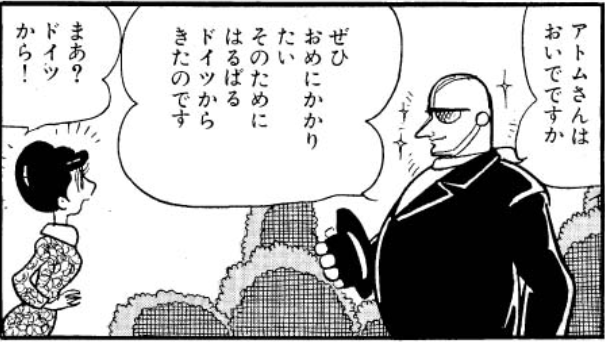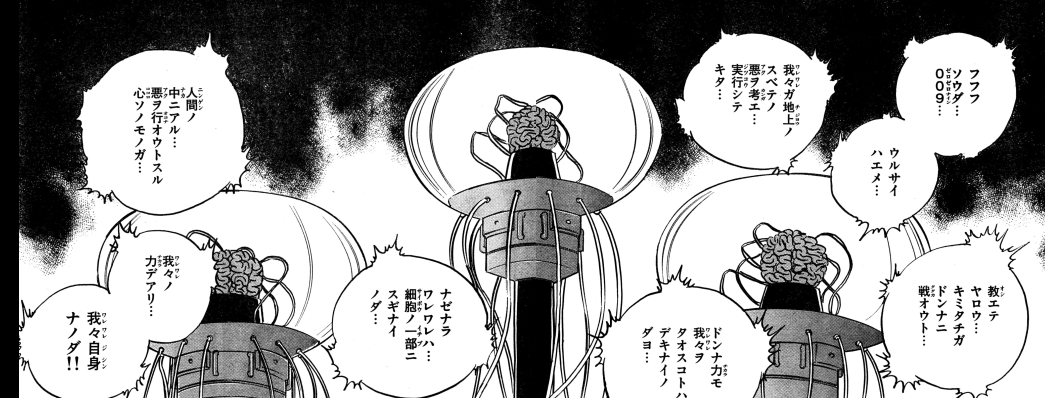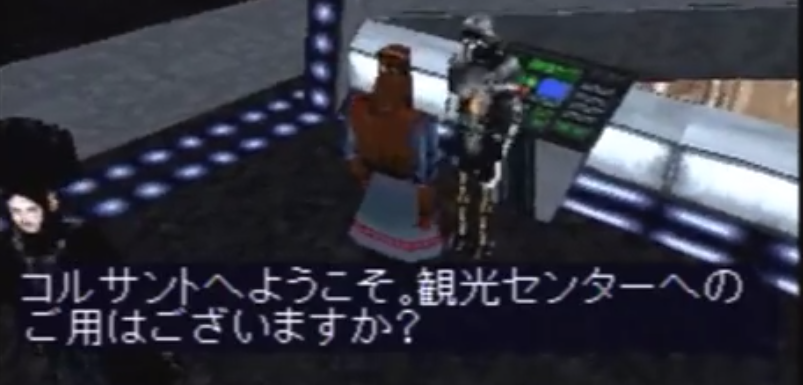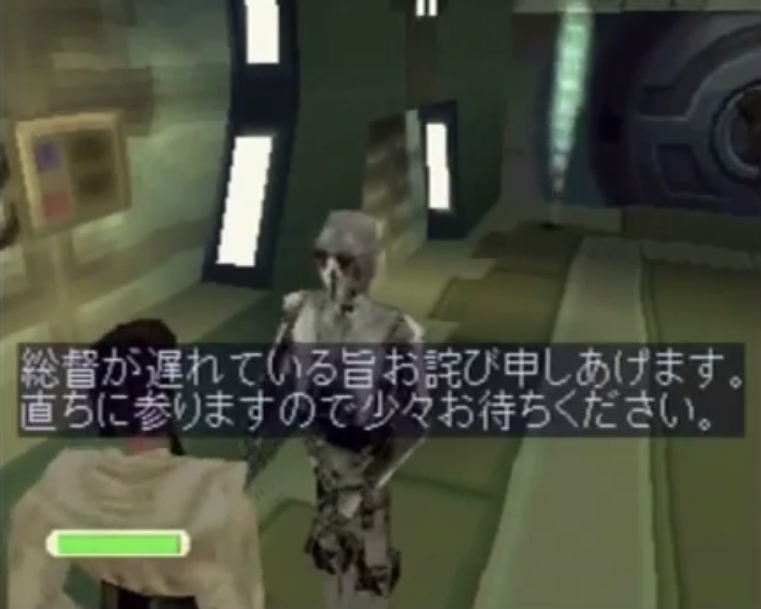Robots and super-computers in Japanese fiction have a tradition of speaking in a rather stilted, polite and logical manner that is most times rendered fully in the angular katakana syllabary which is used to write loan words, foreign personal names and in some cases slang and difficult words that use obscure kanji spellings.
I shall in this blog go through some of the notable cases of robotic speech as well as exceptions to it. Delving into sources originally in Japanese, but also translations that may show how they handle such works in another language.
Part I - Rounded Speech: Tezuka's Heroes.
The first instances of robotic speech are not exactly in katakana. Astro Boy, otherwise known in Japanese as Tetsuwan Atomu (Mighty Atom), stars a robotic hero - a modern Pinocchio, who speaks in a polite boyish register that is not all too different from that of its readers:

こいつ 知ってますよ ぼく 出会いました
Koitsu shittemasu yo boku deaimashita
I know that guy! I have met him before!
Everything is rendered in hiragana and katakana, even the pronouns boku (ぼく) and koitsu (こいつ) are in hiragana. Possibly to reflect his closer-to-human likeness than that of purely mechanical robots, but then again. In the very same chapter a remarkably robotic detective is introduced:

アトムさんはおいでですか
ぜひ おめにかかりたい そのためにはるばるドイツからきたのです
Atomu-san wa oide desu ka
Zehi omenikakaritai sono tame ni harubaru Doitsu kara kita no desu
Might Master Atom be found here?
I have come all the way from distant Germany to pay him my respects.
The German detective robot, Gesicht, looks remarkably more like the stereotypical robot than that of Atom, himself, but his speech purely in hiragana here, furthermore exceptionally polite - a politeness that is part of the generic robot-speech of Japanese media, but here he is merely being courteous towards Atom and his robotic family.
It may, of course, be argued that having an entire series where the main character speak in angular and Stentorian katakana would almost hurt the eyes of the readership, versus that of the friendlier hiragana.
Part II - Angular Utterances: "WE, THE HIVE-MIND."
One classic example of the katakana-speech of electronic beings can be seen in Cyborg 009, where the main character Joe Shimomura, himself a cyborg and the titular one, faces the main intelligence behind the organisation Black Ghost, which is none other than brains in jars being cybernetically kept alive and exists as a manner of hive-mind.

フフフ ソウダ…009…
ウルサイハエメ…
教エテヤロウ…キミタチガドンナ戦オウト…
我々ガ地上ノスベテノ悪ヲ考エ…実行シテキタ…
ドンナ力モ我々ヲタオスコトハデキナイノダヨ…
ナゼナラワレワレハ…細胞ノ一部ニスギナイノダ…
人間ノ中ニアル…悪ヲ行ナウトスル心ソノモノガ…
我々ノ力デアリ…我々自身ナノダ!!
ムダダ… ムダダ!!
ムダダヨ 009!
Fu fu fu souda ... 009 ...
Urusai hae me...
Oshiete yarou... Kimi-tachi ga donna tatakou to...
Wareware ga chijou no subete no aku o kangae ... jikkou shite kita...
Donna chikara mo wareware o taosu koto wa dekinai no da yo...
Nazenara wareware ... saibou no ichibu ni suginai no da...
Ningen no naka ni aru... aku o okonau to suru kokoro sono mono ga ...
Muda da... Muda da!!
Muda dayo 009
"HA HA HA.... THAT IS RIGHT, 009.
YOU WRETCHED FLY....
WE SHALL TEACH YOU, WHY YOU CHILDREN ARE FIGHTING...
WE ARE ALL OVER THE SURFACE OF THE WORLD PRACTISING OUR NOTIONS OF EVIL....
WE CANNOT BE DEFEATED BY MEANS OF ANY POWERS....
HENCE WE CANNOT BE MERELY PART OF ONE CELL...
IT IS DEEP WITHIN THE VERY HEARTS OF HUMANS THAT THE VERY WICKEDNESS THAT THE CONDUCT IS....
WE ARE THAT VERY POWER, WE ARE THAT VERY THING
IT IS POINTLESS... IT IS POINTLESS!!
YOU CANNOT AVAIL, 009!"
Technically speaking - pun intended - they are not robots, however, they are not humans either, they are cyborgs and their speech rendered in all-caps here reflects the thundering and mechanical utterances that in cascading revelations expose that they, the main brains of Black Ghost, are more than their physical constructs, but that they consist of an ideal, thus their way of speaking is not just generic robot-speech, but signifies how inhuman they have become in their pursuit of transcending the flesh. Replete with wareware (我々・ワレワレ) in both kanji and katakana, as their first person plural pronoun that is starkly old fashioned and formal to drive home their superlative arrogance, they refer to Joe and his companions as kimi-tachi (キミタチ), the informal second person plural which gives off a tone of "you children," since it is very much here used as a belittling tone hence my choice of translating it - adding also the initial hae me (ハエメ, "wretched fly"). There are no contractions in their speech, thus reducing any possible illusions of informality and thereby that they are purely vast, cold and unsympathetic intellects - jarred brains.
Part III - In Translation.

コルサントへようこそ。観光センターのご用にございますか?
Korusanto e youkoso. Kankou sentâ no goyou ni gozaimasuka?
"Welcome to Coruscant. Do you, sir and ma'am, have any business with the Sightseeing Center?"
In Star Wars Episode I: The Phantom Menace which was a adventure game based off the film of the same name and series, our cast are taken across the various worlds that the narrative of the film spans across. This particular case features Captain Panaka, the head of the royal bodyguards, being on Coruscant - a vast city planet - and is asked by a droid operating one of the lifts, as Panaka is in dire need to hurrying the Queen Elect, Amidala, to her official errands.
Here as well, as seen with Gesicht, it is polite speech with little to no katakana, except in the loanwords such as sentâ (センター) for a centre, typically a shopping-centre or tourist centre, or just representing the English word in all its many meanings.
Said robot has an Upper RP accent, i.e. the Queen's English, in the original and this, the Japanese adaptation, thus his extremely polite register in the Japanese version here is also communicated by the original's posh accent.
In the first stage of the game where Jedis Qui-Gon Jinn and Obi-Wan Kenobi are aboard a Trade Federation vessel, they are greeted by an extremely decorous droid with similar speech patterns:

総督が遅れている旨お詫び申し上げます。直ちに参りますので少々お待ちください。
Soutouku ga okurete iru mune owabi moushiagemasu. Tadachi ni mairimasunode shoushou omachi kudasai.
"My most humble apologies as it would seem that the Viceroy is delayed. He shall be here in but a few moments, if you would please wait, Your Excellencies."
Androids be they from the far-flung future or the distant past are incapable of communicating in anything but hyper-polite keigo, well not all of them, as we have seen above.